The food industry is a vast sector that is constantly evolving to meet the ever-growing demand for food. However, in order to produce food on a smaller or larger scale, it is necessary to meet a number of requirements for raw materials, machinery and many others.
Table of contents:
Food production – where to start?
Food production facilities, regardless of the scale of production, must meet many requirements related to the safety of the production process and the quality of the products. They vary according to the type of food products. For example, requirements that apply to plant-based foods are different than those that apply to animal products.
Before you start planning your food production process, you should develop and implement a food safety and quality assurance system that complies with the requirements for the specific product you intend to produce. In the case of animal products, you can learn about the requirements in your local veterinary inspection office. If you plan to produce plant food, ask the sanitary and epidemiological station to provide you with the requirements.
The standards and procedures developed by the food production facility must be reviewed and approved by the relevant authorities, i.e. the district veterinarian (for animal products) or the sanitary and epidemiological station (for food of plant origin).
Food production – legal requirements
A number of procedures have been developed to help businesses get started in food production. The procedures must be implemented by every food production facility, regardless of whether it produces plant or animal products. The procedures are included in Annexes I and II of Regulation 852/2004 of the European Parliament and of the Council of 29 April 2004 on the hygiene of foodstuffs.
GMP, or Good Manufacturing Practice, is the most important procedure specified in the annexes. It contains rules and procedures for the collection of raw and production materials, storage of products, primary processing and pre-processing, and distribution of finished food products.
Specifically, GMP requires that you maintain order and cleanliness in the production area, ensure appropriate humidity and temperature for longer preservation of the nutritional value and freshness of the products, and protect them from any type of contamination.
GHP, or Good Hygiene Practice, sets out the rules for cleaning and disinfection in food production. For example, GHP describes the requirements for the buildings and premises in which food production takes place. One of them is that each production room should have washbasins with cold and hot water and soap.
Another procedure listed in the annexes is HACCP, or Hazard Analysis and Critical Control Point System. It enhances food safety by identifying and assessing food hazards in terms of health requirements and determining the likelihood of these hazards at all stages of the production and distribution of food products.
Other requirements in the annexes include testing of the composition of the packaged food for compliance with the composition provided on the packaging and regular laboratory inspection of machinery, tools, and surfaces used in production. It is also necessary to carry out shelf-life studies to determine how long the food can be stored.
Food production – machinery requirements
One of the hazards in food production is the machinery used in the production process. The machines can pose material, chemical, and biological risks, each of which can lead to contamination of the food being processed, which can be hazardous to the health of the consumer.
This is why machinery manufacturers must eliminate or reduce the risks in food production at the design stage. In particular, there are requirements for materials from which food machinery is made. They must be corrosion-resistant, non-toxic, and non-absorbent and cannot give off odours or dyes or contaminate the food in any way. Mainly stainless steels and some plastics meet these requirements.
In the construction of machinery for the food industry, it is also crucial that surfaces in direct contact with food are properly finished and treated so that they have the lowest possible roughness. This makes them easier to clean. Designers should also avoid recesses, crevices, etc. that make it difficult to keep the machine clean.
Where possible, plain bearings should be used. Otherwise, bearings must be lubricated with grease that can come into contact with food. It is also necessary to provide drainage for water and chemicals used to clean the machine. Choosing suitable materials and ensuring easy cleaning of the machine are the main requirements for equipment in the food industry.
Requirements in food production. Short summary
In every industry, there are rules and requirements that are not relevant to other industries. In the food industry, compliance with the requirements is critical as the appropriate quality of the products has a direct impact on the life and health of consumers. Therefore, there are a number of procedures and requirements that food producers must put in place and comply with before their products hit store shelves.
They include the proper handling of raw materials used in production, the storage and transport of finished products, and the proper hygiene of the entire production process. Machines for the food industry are also subject to special requirements. Machinery manufacturers have to design machines in such a way that they are easy to clean and do not pose the risk of food contamination.
If you are looking for a machine for your food production company, you should have it made by a company that has experience with food equipment, such as Unilogo. If you would like to learn more about our machines, feel free to use the contact form at www.unilogo.com. Our team will answer all your questions and help you choose the right product for your company.


